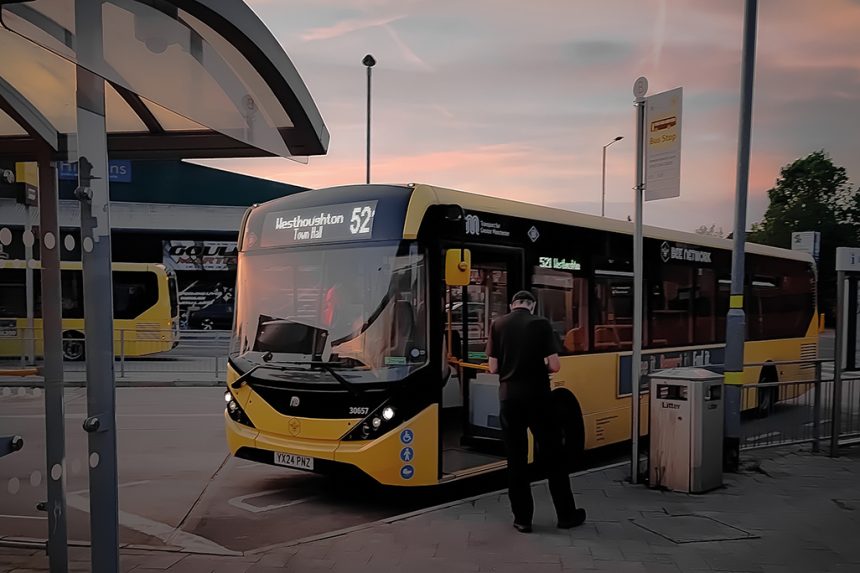Those who know me understand I dislike wasting money and will go out of my way to save two pence. That’s not a joke; it’s a mindset. This perspective has driven my over 30 years of involvement in innovation, analysis, and accountability, helping me distinguish between genuine progress and polished, overfunded dead ends.
When discussions about franchising—or re-regulating, if you prefer—arise in public transport, I don’t see policy debates. I see concerns about cost, commitment, and consequences. Regardless of the terminology used, it comes down to a simple, challenging question: where should taxpayers’ money be allocated for the best impact?
Let’s not pretend this is just about buses or fares or whether the bus runs five minutes late. This is about hundreds of millions of pounds – your money, my money – flowing through a system that is either building real public value or haemorrhaging it through inefficiency, duplication, vanity projects, and endless consultancy fees. The people making those decisions may never wait for a bus again, but the rest of us will pay for them for decades. So, let’s talk straight about where we are, what’s being spent, and what that means on the ground.
In Greater Manchester, a significant example of devolved transport reform is currently developing. Transport for Greater Manchester (TfGM) had experienced financial uncertainty due to the pandemic. The expansion of the Greater Manchester Metrolink has added to the strain on budgets already affected by inflation and operational costs. TfGM’s funding depends on government grants, local authority levies, and commuter fares, but this funding structure is now destabilised.
In 2023, the ten local councils that make up Greater Manchester paid a total of £105 million to TfGM via the current levy system. Manchester City Council contributed between £20 and £25 million. Considering the city’s financial challenges, including housing and social care, this is a substantial annual expense. However, it accounts for only a small portion of the region’s total transport reform costs.
Central to these reforms is bus franchising. Proponents claim it ensures democratic control, seamless services, and stable fares. Opponents highlight setup costs, increased bureaucracy, and uncertain returns. The total cost of implementing the Greater Manchester bus franchising system is now estimated at £134 million, covering legal fees, depot upgrades, and new systems. Annual operating expenses are expected to be between £20 and £30 million, with some covered by grants. We finance the remaining costs.
The UK Government has supported Greater Manchester’s transport goals through significant initiatives. The Bus Services Improvement Plan (BSIP) allocated £94.8 million to reduce fares and enhance routes. An additional £1.07 billion from the City Region Sustainable Transport Settlement (CRSTS) is allocated over five years to promote sustainable transport, though not solely for buses.
Other grants, such as the Transforming Cities Fund and Future Mobility Zones, also played roles in research and early franchising planning. However, experienced project managers often emphasise that startup funding is less problematic than ensuring long-term sustainability, which remains the challenge.
The shift to electric buses is framed as essential for climate and public health reasons. While there’s agreement on the importance, the details reveal challenges. Electric buses cost between £400,000 and £500,000 each, which is much higher than for traditional diesel buses. The initial purchase of 300 electric buses alone totals £120 to £150 million, which only accounts for the vehicles.
Here’s the brutal truth: good intentions do not make good economics. Franchising public transport might seem like a return to accountability and equity, but unless costs are controlled with military precision, it will merely swap one inefficient model for another. The promise of “better buses” quickly fades if the routes are cancelled, the subsidies dry up, or the technology breaks before it pays for itself.
Meanwhile, the travelling public still waits. Buses remain delayed. A pensioner in Wythenshawe struggles to reach her medical appointments on time. A cleaner in Salford still cannot afford a monthly pass without sacrificing meals. The language of change must reflect these everyday realities; otherwise, it risks being seen as mere spin.
While electrification is theoretically environmentally beneficial, it raises economic uncertainties. There’s no public breakdown of how battery recycling, disposal, and replacement costs will be covered after 2030. The concern is that operating expenses may increase significantly once initial capital funding ends, potentially leaving taxpayers to bear the burden again.
What’s the alternative? Ultimately, Greater Manchester’s success or failure with franchising will depend less on ideology and more on execution and transparency.
I think a broader discussion is needed regarding cost duplication among devolved regions. Suppose each UK city implements its own franchising model, software, and depot upgrades. Do we foster scalable efficiency or end up with a patchwork of custom systems that can’t work together? This question remains unanswered.
I’m not opposed to investing, but we must avoid reckless spending. This isn’t about opposing reform; it’s about demanding accountability. The public expects more than headlines—they want precise, measurable results that can be demonstrated. It’s not just about buses, but also the rising trend of outsourcing responsibility to higher levels while costs decrease. It’s about slick reports and public consultations failing to influence change. It’s about leaders who speak of transformation but secretly endorse the same contracts repeatedly, year after year.
Greater Manchester has the potential to succeed and serve as a model for how a city region can take control of its future. To do so, we must examine the data more thoroughly, not only focusing on major grants. We must track where every pound is spent, who benefits from it, and what tangible improvements occur.
This requires prioritising verifiable outcomes over press releases and pilot programs, emphasising audited and proven results. The accurate measure of public transport isn’t just its operational costs, but whether it effectively serves its users- helping a nurse get to work, an apprentice to college, or a parent to a job interview. It must do so safely, reliably, affordably, and sustainably, even a decade from now, without the need for emergency bailouts.
Ultimately, I return to my starting point. I still cross the road to save two pence. It’s not about being stingy; it’s about principle. If we don’t track every penny, then who will?
The next time someone tells you franchising is the answer, ask them to show you the maths. The real maths. With running costs, maintenance, salaries, debt servicing, and long-term upgrades. Ask them what happens when the grants dry up. Ask them who owns the risk. Ask them, always, where taxpayers’ money is best spent.
Until we have those answers, we should be cautious with every penny. Careful, not cynical. Ambitious, but not extravagant. Because innovation isn’t what you claim you’re doing, it’s what you can afford to keep doing, long after the cameras leave.
Conclusion: The net cost of bus franchising has increased significantly to ~£226 million annually (2025/26). Operating and administrative cost estimates remain plausible but require specific sourcing if necessary.
Stephen Wigglesworth
Former Duty Manager, Arriva NW


























